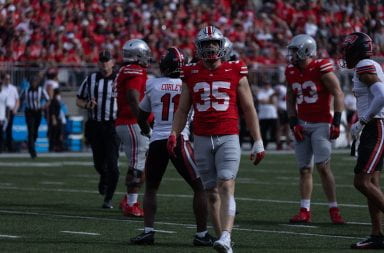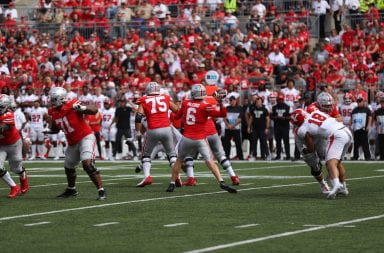
New England Patriots quarterback Tom Brady during a warmups prior to preseason action against the Carolina Panthers on Friday, Aug. 28, 2015, at Bank of America Stadium in Charlotte, North Carolina.
Credit: Courtesy of TNS
After a nearly month-long trial that began on Aug. 12, Judge Richard Berman nullified the NFL’s four-game suspension of New England Patriots quarterback Tom Brady on Thursday morning.
On Jan. 18 in the AFC Championship Game versus the Indianapolis Colts, it was discovered that 11 game balls provided by the Patriots were underinflated significantly — thus launching the scandal known as “deflategate.”
On May 6, lawyer Ted Wells — who had been investigating Brady’s affiliation with the tampering of the footballs — reported in the Wells Report that he had concrete evidence to show Brady’s direct affiliation with the tampering of game balls. Five days later, the NFL suspended Brady for the first four games of the 2015 season. Brady decided to appeal his suspension and arrived at NFL headquarters on June 23. A month later, on July 28, the NFL upheld his suspension and denied the NFL Players Association access to the league’s investigative notes and a request to question Jeffrey Pash, the editor of the Wells Report.
Fast forward to Aug. 12, when NFL commissioner Roger Goodell and the NFL met with Brady and the NFLPA in court for their first session. The NFLPA argued the NFL and Commissioner Roger Goodell did not have sufficient grounds for suspending Brady. Goodell’s initial punishment of four games to Brady was determined by Article 46 of the collective bargaining agreement, which states, “The Commissioner and a club will not both discipline a player for the same act or conduct. The Commissioner’s disciplinary action will preclude or supersede disciplinary action by any Club for the same act or conduct.”
Why the NFLPA ever agreed to such a statement is highly questioned by the media, but what ended up being the largest fault by Goodell and the NFL was the lack of access Brady and the NFLPA received.
On Thursday, Berman made his official ruling, which exonerated Brady from his suspension, stating,
Berman cited three “legal deficiencies” that led him to his ruling: he found that Brady did not have adequate notice of his potential discipline, was denied the chance to meet with one of the NFL’s two lead executives and was not granted “equal access to investigative files.”
This ruling is one of several that has gone against Roger Goodell and the NFL in the last four years. From the 2012 “Bountygate” with the New Orleans Saints where Goodell suspended four players for a varying number of games during the season — only to be overturned and no player had to serve a suspension. During the 2014 and 2015 offseasons, Ray Rice, Adrian Peterson and Greg Hardy have all been involved in separate domestic violence cases. Each player went through an appeal process in which they all won their cases and had their suspensions reduced significantly.
With eight suspensions reduced from Goodell’s initial punishment in the last four years, he has yet to set a primary example for disciplinary action against players who fail to comply with league rules. Commissioner Goodell’s reputation and popularity among players and fans — or lack thereof — takes another hit due to the inadequacies of his punishments given out to players. Brady is the first to go to court and win against the commissioner and the NFL — and he likely won’t be the last.
With Brady’s win against the NFL, this could start a trend of future players facing disciplinary action to take action in court. Players would not take a smaller penalty through the appeal process, but rather go to court and completely sink Goodell’s reputation — the little that is still floating above water. The public and media began to be infuriated by Goodell’s actions as commissioner when TMZ got ahold of the video where Rice physically abused his fiancée — now wife — in an Atlantic City elevator before the NFL obtained the video and took action against Rice.
During Goodell’s time as commissioner of the nation’s most popular sport, he has continuously dissatisfied loyal NFL enthusiasts with his rash punishments without merit, and the disastrous 2012 referee strike is another mark on his legacy.
Brady is a mere character in the continued scrutiny of Goodell’s time as commissioner. When Goodell’s contract is up in 2019, these disciplinary decisions and his unpopularity should be monumental factors in whether or not he is reinstated as commissioner of the NFL.
As for Brady, he is now set to start the first game on Sept. 10 against the Pittsburgh Steelers and will look to put “Deflategate” behind him. Patriots owner Robert Kraft spoke to reporters after the ruling, according to the Patriots’ website, saying, “Tom Brady is a classy person of the highest integrity.” He later added, “Now, we can return our focus to the game on the field.”


